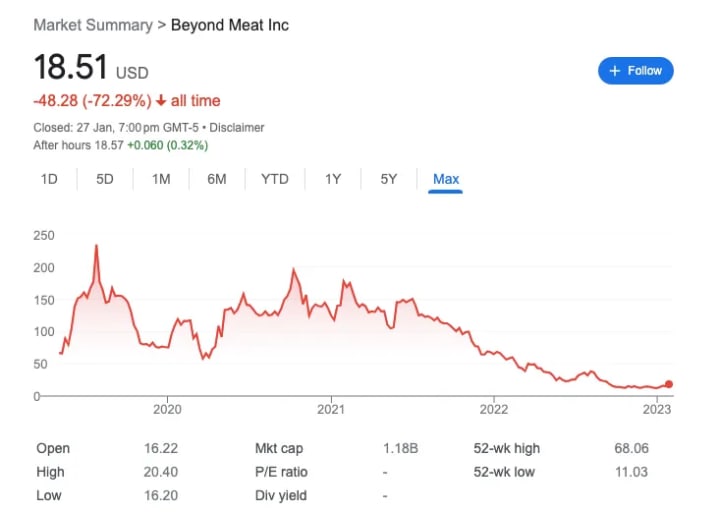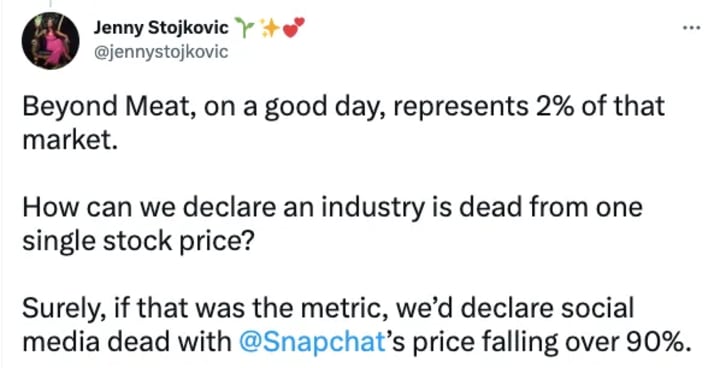No. Plant-Based Meat Is Not a Fad and Is Here To Stay
Beyond Meat is not the S&P500 of the plant-based meat market

As someone who is passionate about the food technology and alternative protein industry (and works in the industry), I am compelled to speak out against the recent wave of negative coverage of the plant-based meat sector.
While it is important for any industry to be held accountable, it is crucial to approach this topic with a balanced and informed perspective.
Unfortunately, many of the articles currently circulating are biased and misleading, and it is my intention to provide a more nuanced understanding of the plant-based meat industry.
At least I’ll try to.
Beyond Meat (BYND) is not the plant-based meat index

It is wrong to assume that Beyond Meat represents the entire plant-based meat market because it is only one brand among many in the industry.
There are over 1,000 plant-based meat, seafood, dairy, and egg companies in the market, and the majority of these articles mainly (sometimes only) focus on Beyond Meat.
This creates a misleading perception of the industry and ignores the contributions and innovations of other companies.
While Beyond Meat had an underwhelming 2022, Impossible Foods reported a 50% increase in retail sales in the same year.
For the plant-based meat sector to succeed, strong leadership, persuasive branding, and continuous product R&D are essential.
The recent triumphs of businesses like Impossible Foods, which over the past 18 months demonstrate this. and they continue to attract new customers.
As Sonalie Figueiras stated:
“Hot take: Beyond Meat is having a bad year because the company could be run better, not because plant-based meat is done and dusted.”

The US is not the world
Another major flaw in the recent hit pieces against the plant-based meat industry is that they are mostly focused on US retail sales data. This data shows flat growth in plant-based meat sales, but it fails to take into account the success of the industry in other regions around the world.
Elsewhere, there is evidence that people are consuming less animal meat and starting to embrace plant-based meat. Even though the market for plant-based meat is still in its infancy in Asia, there is already rising demand for these products.
If you are interested to learn about the alternative protein industry in APAC, I highly recommend Green Queen Media’s 2022 Alternative Protein Industry Report.
Over in Europe, plant-based meat is thriving and experiencing considerable sales increase. Additionally, with several companies and brands in the region driving this growth, Latin America also seems to be a blooming region for the industry.
Plant-based meat sales in Latin America have been projected to grow with a CAGR of 11.45% by 2027. Michal Klar’s report is an excellent starting point for a more in-depth examination of the state of plant-based meat sales in the US and overseas.
To assume that the plant-based meat industry is solely based on US retail sales is a major oversight. These articles only provide a narrow and incomplete understanding of the global market. It’s important to recognize that the demand for plant-based meat is on the rise globally.
Factors such as health consciousness, environmental sustainability, and animal welfare are driving this trend in other parts of the world, and these articles fail to take this into account.
We need plant-based meat to reach climate targets

Most of the hit pieces against plant-based meat lack viable solutions for addressing the environmental concerns with our current food system.
These costs impact not only the environment but also human health and food security. Plant-based meat can provide a viable solution to these issues, yet these articles often fail to offer any alternatives or solutions.
If we abandon plant-based proteins, we will not meet climate targets.
I’m not saying plant-based meat (or alt proteins in general) is the silver bullet that will fix our unsustainable food system.
But, as this report (and many more) presented at the World Economic Forum highlights, they greatly mitigate climate risk by a significant reduction in GHG emissions and accelerating the transition to a low-carbon economy. And that’s pretty good.
If alternative proteins achieve a 20% market share by 2035, it could lead to the conservation of 400–800 million hectares of land, equivalent to 7–15% of the world’s farmland today, which could then be used for reforestation and wildlife restoration and would actively remove CO2 from the atmosphere.
As Jennifer Stojkovic mentioned: “The Dutch government recently shut down multiple livestock farms upon realizing there is no way for the EU to meet projected climate goals without producing less meat. Animal agriculture is responsible for 57% of greenhouse gas emissions in agriculture. If we’re going to address climate change, meat alternatives need to be part of the conversation.”
The wrap-up
It’s important to critically analyze the hit pieces and not take them at face value because they often fail to provide a comprehensive and balanced view of the industry.
I am not saying that the plant-based meat industry is flawless. There are too many mediocre products that don’t taste great and are more expensive than conventional meat.
During the low-interest rate environment over the past few years, investors got greedy and started throwing money at food tech startups without doing proper due diligence (probably because of FOMO? I don’t know I’m not a VC).
As I mentioned in one of my previous articles, in order to appeal to a wider customer base, plant-based meat must reach parity with animal meat in terms of taste, texture, and price.
The plant-based meat industry is still in its infancy. It’s crucial to consider all the facts before jumping to conclusions.
While the industry may not have reached the lofty expectations of most consumers, the alternative protein industry in general has made tremendous progress since Beyond and Impossible burgers v1, launched in 2016.
Plant-based meat is a promising solution to address the health, environmental, and sustainability concerns associated with industrial meat production. It’s time to give plant-based meat the recognition it deserves and stop dismissing it as just a passing fad.
About the Creator
Eshan Samaranayake
Exploring how biotech, food tech, alternative proteins, and business can help develop a sustainable world 🌏 https://linktr.ee/eshan.s






Comments
There are no comments for this story
Be the first to respond and start the conversation.